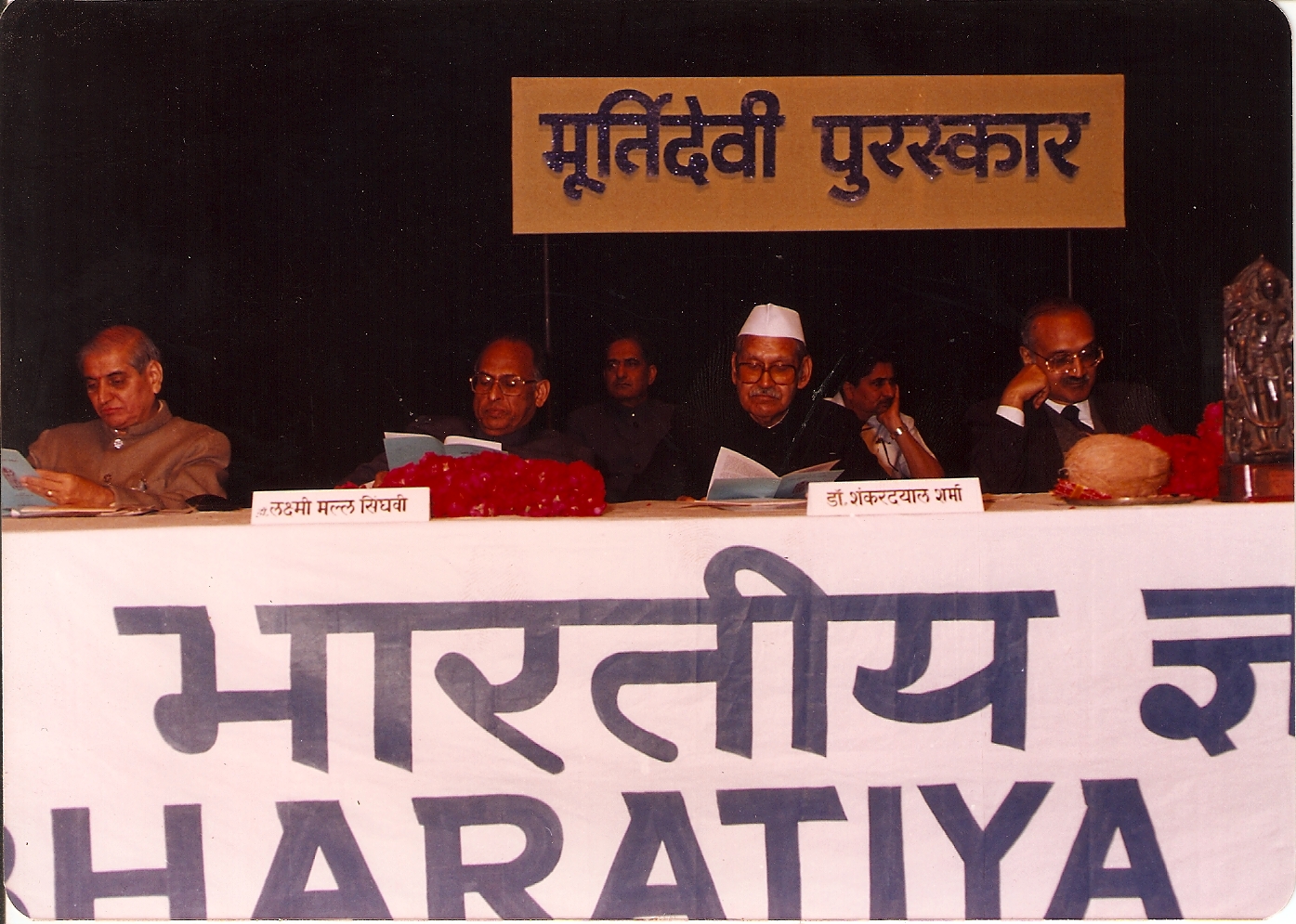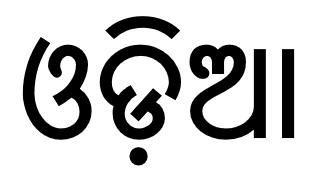|
Jnanpith Award
The Jnanpith Award is the oldest and the highest Indian literary award presented annually by the Bharatiya Jnanpith to an author for their "outstanding contribution towards literature". Instituted in 1961, the award is bestowed only on Indian writers writing in Indian languages included in the Eighth Schedule to the Constitution of India and English, with no posthumous conferral. From 1965 till 1981, the award was given to the authors for their "most outstanding work" and consisted of a citation plaque, a cash prize and a bronze replica of Saraswati, the Hindu goddess of knowledge and wisdom. The first recipient of the award was the Malayalam writer G. Sankara Kurup who received the award in 1965 for his collection of poems, Odakkuzhal (Poetry), Odakkuzhal (''The Bamboo Flute''), published in 1950. The rules were revised in subsequent years to consider only works published during the preceding twenty years, excluding the year for which the award was to be given and the cash priz ... [...More Info...] [...Related Items...] OR: [Wikipedia] [Google] [Baidu] |
Bharatiya Jnanpith
Bharatiya Jnanpith a literary and research organization, based in New Delhi, India, was founded on February 18, 1944Encyclopaedia of Indian literature vol. 1, p. 298 1987, Sahitya Akademi, by Sahu Shanti Prasad Jain of the Sahu Jain family and his wife Rama Jain to undertake systematic research and publication of Sanskrit, Prakrit, Pali and Apabhramsha texts and covering subjects like religion, philosophy, logic, ethics, grammar, astrology, poetics, etc.jnanpith.net , Bhartiya Jnanpith Official website Its research and publication programme started with the publication of the texts. A temple at |
Odia Language
Odia (, ISO: , ; formerly rendered Oriya ) is an Indo-Aryan language spoken in the Indian state of Odisha. It is the official language in Odisha (formerly rendered Orissa), where native speakers make up 82% of the population, and it is also spoken in parts of West Bengal, Jharkhand, Andhra Pradesh and Chhattisgarh. Odia is one of the many official languages of India; it is the official language of Odisha and the second official language of Jharkhand. The language is also spoken by a sizeable population of 700,000 people in Chhattisgarh. Odia is the sixth Indian language to be designated a classical language, on the basis of having a long literary history and not having borrowed extensively from other languages. The earliest known inscription in Odia dates back to the 10th century CE. History Odia is an Eastern Indo-Aryan language belonging to the Indo-Aryan language family. It descends from Odra Prakrit, which evolved from Magadhi Prakrit, which was spoken in east India ... [...More Info...] [...Related Items...] OR: [Wikipedia] [Google] [Baidu] |
Prothom Protishruti
''Prothom Protishruti'' (; ), also spelled Pratham Pratishruti, is a 1964 Bengali novel by Ashapurna Devi. Considered to be Devi's magnum opus, it tells a story of Satyabati who was given away in marriage at the age of eight to maintain the social norms, and was kept under strict surveillance of brahmanical regulations. The novel narrates Satyabati's struggle to fight against family control, mental violence of the polygamy system, and social prejudices in patriarchal society. It won Rabindra Puraskar in 1965 and Jnanpith Award in 1976. Background The title ''Prothom Protishruti'' (First Promise) refers to the promise Satyabati, the protagonist, has made to educate her daughter Subarna and in which she failed. Critic Madhuri Chatterjee noted that the title also can be interpreted in positive terms — it could be the promise with which Satyabati leaves her household to demand answers regarding the position of women. Characters Spanning 48 chapters, the novel has about 50 charac ... [...More Info...] [...Related Items...] OR: [Wikipedia] [Google] [Baidu] |
Ashapoorna Devi
Ashapurna Devi (8 January 1909 – 12 July 1995), also Ashapoorna Devi or Ashapurna Debi, was a prominent Indian novelist and poet in Bengali. In 1976, she was awarded the Jnanpith Award and Padma Shri by the Government of India, D.Litt. by the Universities of Jabalpur, Rabindra Bharati, Burdwan and Jadavpur. Vishwa Bharati University honoured her with Deshikottam in 1989. For her contribution as a novelist and short story writer, the Sahitya Akademi conferred its highest honour, the Sahitya Akademi Fellowship, in 1994. Biography Ashapurna Devi was born in a Baidya family on 8 January 1909 in North Calcutta. Her birth name was Asha Purna Devi (Gupta). Her early childhood was spent in a traditional and extremely conservative family. Female children of the house were not allowed to go to school. Private tutors were employed only for the boys. It is said that as a baby Ashapurna used to listen to the readings of her brothers sitting opposite to them and that was how she learnt ... [...More Info...] [...Related Items...] OR: [Wikipedia] [Google] [Baidu] |
Malayalam Language
Malayalam (; , ) is a Dravidian language spoken in the Indian state of Kerala and the union territories of Lakshadweep and Puducherry (Mahé district) by the Malayali people. It is one of 22 scheduled languages of India. Malayalam was designated a "Classical Language of India" in 2013. Malayalam has official language status in Kerala, and Puducherry ( Mahé), and is also the primary spoken language of Lakshadweep, and is spoken by 34 million people in India. Malayalam is also spoken by linguistic minorities in the neighbouring states; with significant number of speakers in the Kodagu and Dakshina Kannada districts of Karnataka, and Kanyakumari, district of Tamil Nadu. It is also spoken by the Malayali Diaspora worldwide, especially in the Persian Gulf countries, due to large populations of Malayali expatriates there. There are significant population in each cities in India including Mumbai, Bengaluru, Delhi, Kolkata, Pune etc. The origin of Malayalam remains a matter of ... [...More Info...] [...Related Items...] OR: [Wikipedia] [Google] [Baidu] |
Odakkuzhal (Poetry)
''Odakkuzhal'' is a collection of poems written by G. Sankara Kurup in Malayalam. It was published by Mathrubhumi in 1950. It won the first prestigious Jnanpith Award The Jnanpith Award is the oldest and the highest Indian literary award presented annually by the Bharatiya Jnanpith to an author for their "outstanding contribution towards literature". Instituted in 1961, the award is bestowed only on Indian w ... in 1965. The book consists of 60 symbolist lyrics. References Malayalam-language literature {{India-literature-stub ... [...More Info...] [...Related Items...] OR: [Wikipedia] [Google] [Baidu] |
Hindu Goddess
Devī (; Sanskrit: देवी) is the Sanskrit word for 'goddess'; the masculine form is ''deva''. ''Devi'' and ''deva'' mean 'heavenly, divine, anything of excellence', and are also gender-specific terms for a deity in Hinduism. The concept and reverence for goddesses appears in the Vedas, which were composed around the 2nd millennium BCE. However, they do not play a vital role in that era. Goddesses such as Lakshmi, Parvati, Durga, Saraswati, Sita, Radha and Kali have continued to be revered in the modern era. The medieval era Puranas witness a major expansion in mythology and literature associated with Devi, with texts such as the Devi Mahatmya, wherein she manifests as the ultimate truth and supreme power. She has inspired the Shaktism tradition of Hinduism. Further, Devi and her primary form Parvati is viewed as central in the Hindu traditions of Shaktism and Shaivism. Etymology ''Devi'' and ''deva'' are Sanskrit terms found in Vedic literature around the 3rd millenni ... [...More Info...] [...Related Items...] OR: [Wikipedia] [Google] [Baidu] |
Saraswati
Saraswati ( sa, सरस्वती, ) is the Hindu goddess of knowledge, music, art, speech, wisdom, and learning. She is one of the Tridevi, along with the goddesses Lakshmi and Parvati. The earliest known mention of Saraswati as a goddess is in the Rigveda. She has remained significant as a goddess from the Vedic period through the modern period of Hindu traditions. She is generally shown to have four arms, holding a book, a rosary, a water pot, and a musical instrument called the veena. Each of these items have a symbolic meaning in Hinduism. Some Hindus celebrate the festival of Vasant Panchami (the fifth day of spring, and also known as Saraswati Puja and Saraswati Jayanti in many regions of India) in her honour, and mark the day by helping young children learn how to write the letters of the alphabet on that day. The goddess is also revered by believers of the Jain religion of west and central India, as well as some Buddhist sects. Etymology Saraswati, is a Sans ... [...More Info...] [...Related Items...] OR: [Wikipedia] [Google] [Baidu] |
Telugu Language
Telugu (; , ) is a Dravidian language spoken by Telugu people predominantly living in the Indian states of Andhra Pradesh and Telangana, where it is also the official language. It is the most widely spoken member of the Dravidian language family and one of the twenty-two scheduled languages of the Republic of India. It is one of the few languages that has primary official status in more than one Indian state, alongside Hindi and Bengali. Telugu is one of six languages designated as a classical language (of India) by the Government of India. Telugu is also a linguistic minority in the states of Karnataka, Tamil Nadu, Maharashtra, Gujarat, Chhattisgarh, Orissa, West Bengal, and the union territories of Puducherry and Andaman and Nicobar Islands. It is also spoken by members of the Telugu diaspora spread across countries like United States, Australia, United Kingdom, Canada, New Zealand in the Anglosphere; Myanmar, Malaysia, South Africa, Mauritius; and the Arabian Gulf count ... [...More Info...] [...Related Items...] OR: [Wikipedia] [Google] [Baidu] |
Tamil Language
Tamil (; ' , ) is a Dravidian language natively spoken by the Tamil people of South Asia. Tamil is an official language of the Indian state of Tamil Nadu, the sovereign nations of Sri Lanka and Singapore, and the Indian territory of Puducherry. Tamil is also spoken by significant minorities in the four other South Indian states of Kerala, Karnataka, Andhra Pradesh and Telangana, and the Union Territory of the Andaman and Nicobar Islands. It is also spoken by the Tamil diaspora found in many countries, including Malaysia, Myanmar, South Africa, United Kingdom, United States, Canada, Australia and Mauritius. Tamil is also natively spoken by Sri Lankan Moors. One of 22 scheduled languages in the Constitution of India, Tamil was the first to be classified as a classical language of India. Tamil is one of the longest-surviving classical languages of India.. "Tamil is one of the two longest-surviving classical languages in India" (p. 7). A. K. Ramanujan described it as "the on ... [...More Info...] [...Related Items...] OR: [Wikipedia] [Google] [Baidu] |
Sindhi Language
Sindhi ( ; , ) is an Indo-Aryan language spoken by about 30 million people in the Pakistani province of Sindh, where it has official status. It is also spoken by a further 1.7 million people in India, where it is a Scheduled languages of India, scheduled language, without any state-level official status. The main writing system is the Perso-Arabic script, which accounts for the majority of the Sindhi literature and is the only one currently used in Pakistan. In India, both the Perso-Arabic script and Devanagari are used. Sindhi has an attested history from the 10th century CE. Sindhi was one of the first languages of South Asia to encounter influence from Persian language, Persian and Arabic following the Umayyad campaigns in India, Umayyad conquest in 712 CE. A substantial body of Sindhi literature developed during the Medieval period, the most famous of which is the religious and mystic poetry of Shah Abdul Latif Bhittai from the 18th century. Modern Sindhi was promoted under ... [...More Info...] [...Related Items...] OR: [Wikipedia] [Google] [Baidu] |



.jpg)




